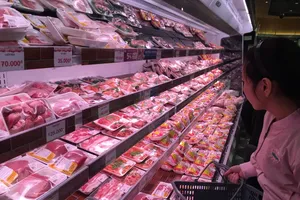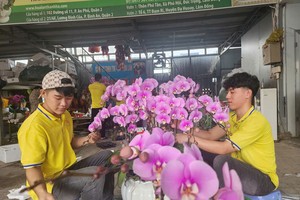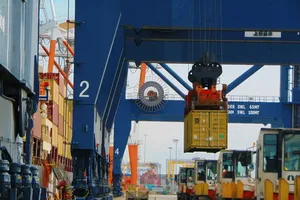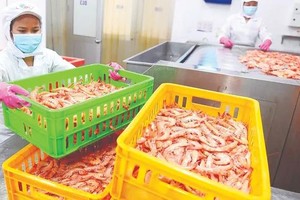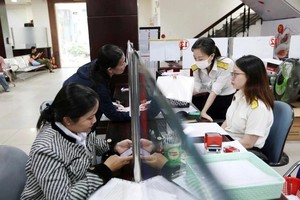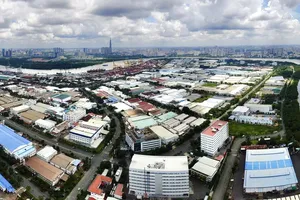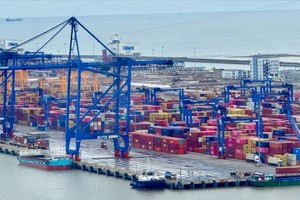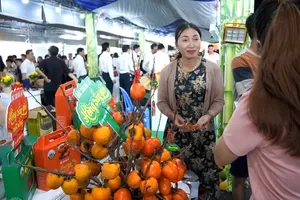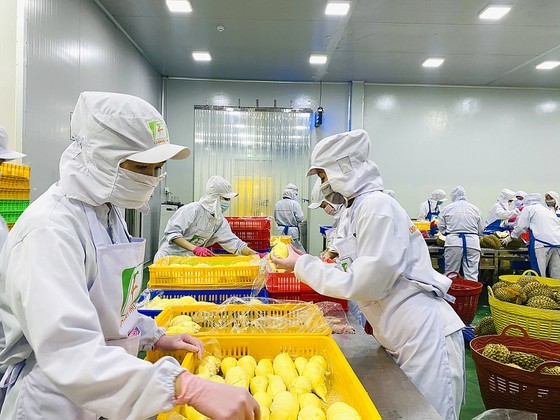 Chanh Thu Fruit Export Company builds a processing factory and cold storage in the raw material growing area. (Photo: SGGP)
Chanh Thu Fruit Export Company builds a processing factory and cold storage in the raw material growing area. (Photo: SGGP)
Suffering losses due to lack of cold storages
During the days near the Lunar New Year, many types of fruits from the Mekong Delta provinces were stagnant at the Northern border gates and had to be dumped because they could not be exported. With the largest area of dragon fruits in the country of more than 32,000 hectares, Binh Thuan Province has an output of about 700,000 tons of dragon fruits per year. However, the number of cold storage warehouses of agricultural products in the province is only 310, with a capacity of about 16,000 tons. It is a modest number compared to the local cultivation capacity.
“If the province has service cold storage warehouses built in the raw material growing area to be proactive in production and export plans, it will help farmers a lot. Thereby, we can build monthly and quarterly production plans to ensure export as well as processing and preservation. Nevertheless, it lacks the most important conditions, which are capital and mechanism,” said Mr. Phan Van Tan, Deputy Director of Binh Thuan Province Department of Agriculture and Rural Development.
Meanwhile, during the days near the Tet holiday, in Lo Pang Commune in Mang Yang District of the Central Highlands province of Gia Lai, container trucks queued in lines waiting to load agricultural products, especially bananas, grown by Hoang Anh Gia Lai Joint Stock Company to transport to Quy Nhon Port or Cai Lai Port to continuously export to Japan, South Korea, and China.
Thousands of hectares of bananas of Hoang Anh Gia Lai Joint Stock Company are grown and harvested in a closed process in which bananas are harvested from the plantation, then brought to the processing factory to pack and put in cold warehouses. Thanks to cold storage, bananas are preserved for 1.5 months at a temperature of 14 degrees Celsius, so they can be freely transported around the world, creating proactiveness in export.
During the fourth wave of Covid-19, many fresh fruit exporters faced a deadlock because of transportation difficulties and suffered losses due to a shortage of cold storage warehouses. Some enterprises are forced to invest methodically to adapt to changes caused by the pandemic. For instance, Chanh Thu Fruit Export Company had to borrow money to invest and start construction of a processing factory in Dak Lak Province, covering an area of more than 10 hectares, with a storage capacity of about 20,000 tons of durian.
The plant is expected to be put into operation by the end of 2022. According to Ms. Ngo Tuong Vy, Deputy Director of the company, durian season lasts for six months, so cold storage is the key for processing when it is out of season.
Exempting land rent and loan interest
In fact, only large enterprises in the agricultural sector can afford to build cold storage warehouses. Investing in cold storage warehouses is not simple for enterprises, even for foreign-invested ones.
Having built modern cold storage warehouses in Long An and Hung Yen provinces, a representative of AJ Total Vietnam said that the main difficulty is the seasonal need for cold storage of agricultural products.
According to Mr. Le Minh Phung, Sales Director of this group, it will be difficult for investors who built cold storage warehouses for rent because it is not possible to store agricultural products seasonally for a few months. If the warehouses are storing other goods, there will be no space for new goods when in season. The second difficulty is that the land rental prices for cold storage warehouses in industrial parks are high; investment cost is large; the construction time is longer than that of a normal warehouse; the power price follows the service price; the warehouse rental price is low. Therefore, many investors are not interested.
According to Mr. Vo Huy Hoang, Chairman of Binh Thuan Dragon Fruit Association, a cold storage warehouse using German technology can keep dragon fruits for one month if they are normally stored. If they are preserved by modern technology, the duration will be twice longer, which almost solves the situation of a bumper crop, low prices. Preliminarily, Binh Thuan Province needs about VND500 billion to build cold storage warehouses.
“The fundamental solution is that the Ministry of Agriculture and Rural Development needs to build raw material growing areas under the highest standards to meet many markets. At the same time, it is necessary to solve the overall problem of agricultural production and focus on supporting investment in cold storage,” Ms. Dinh Thi Phuong Khanh, Deputy Director of the Department of Agriculture and Rural Development of Long An Province, affirmed.
According to economic experts, cold storage warehouses are crucial to stabilize the crop for farmers. To attract investment in cold storage, the Ministry of Agriculture and Rural Development needs to advise the Government to have a mechanism to reduce land rents, exempt loan interest rates, shorten licensing procedures, apply business power prices for cold storage, and subsidize for stored agricultural products.
During the days near the Lunar New Year, many types of fruits from the Mekong Delta provinces were stagnant at the Northern border gates and had to be dumped because they could not be exported. With the largest area of dragon fruits in the country of more than 32,000 hectares, Binh Thuan Province has an output of about 700,000 tons of dragon fruits per year. However, the number of cold storage warehouses of agricultural products in the province is only 310, with a capacity of about 16,000 tons. It is a modest number compared to the local cultivation capacity.
“If the province has service cold storage warehouses built in the raw material growing area to be proactive in production and export plans, it will help farmers a lot. Thereby, we can build monthly and quarterly production plans to ensure export as well as processing and preservation. Nevertheless, it lacks the most important conditions, which are capital and mechanism,” said Mr. Phan Van Tan, Deputy Director of Binh Thuan Province Department of Agriculture and Rural Development.
Meanwhile, during the days near the Tet holiday, in Lo Pang Commune in Mang Yang District of the Central Highlands province of Gia Lai, container trucks queued in lines waiting to load agricultural products, especially bananas, grown by Hoang Anh Gia Lai Joint Stock Company to transport to Quy Nhon Port or Cai Lai Port to continuously export to Japan, South Korea, and China.
Thousands of hectares of bananas of Hoang Anh Gia Lai Joint Stock Company are grown and harvested in a closed process in which bananas are harvested from the plantation, then brought to the processing factory to pack and put in cold warehouses. Thanks to cold storage, bananas are preserved for 1.5 months at a temperature of 14 degrees Celsius, so they can be freely transported around the world, creating proactiveness in export.
During the fourth wave of Covid-19, many fresh fruit exporters faced a deadlock because of transportation difficulties and suffered losses due to a shortage of cold storage warehouses. Some enterprises are forced to invest methodically to adapt to changes caused by the pandemic. For instance, Chanh Thu Fruit Export Company had to borrow money to invest and start construction of a processing factory in Dak Lak Province, covering an area of more than 10 hectares, with a storage capacity of about 20,000 tons of durian.
The plant is expected to be put into operation by the end of 2022. According to Ms. Ngo Tuong Vy, Deputy Director of the company, durian season lasts for six months, so cold storage is the key for processing when it is out of season.
Exempting land rent and loan interest
In fact, only large enterprises in the agricultural sector can afford to build cold storage warehouses. Investing in cold storage warehouses is not simple for enterprises, even for foreign-invested ones.
Having built modern cold storage warehouses in Long An and Hung Yen provinces, a representative of AJ Total Vietnam said that the main difficulty is the seasonal need for cold storage of agricultural products.
According to Mr. Le Minh Phung, Sales Director of this group, it will be difficult for investors who built cold storage warehouses for rent because it is not possible to store agricultural products seasonally for a few months. If the warehouses are storing other goods, there will be no space for new goods when in season. The second difficulty is that the land rental prices for cold storage warehouses in industrial parks are high; investment cost is large; the construction time is longer than that of a normal warehouse; the power price follows the service price; the warehouse rental price is low. Therefore, many investors are not interested.
According to Mr. Vo Huy Hoang, Chairman of Binh Thuan Dragon Fruit Association, a cold storage warehouse using German technology can keep dragon fruits for one month if they are normally stored. If they are preserved by modern technology, the duration will be twice longer, which almost solves the situation of a bumper crop, low prices. Preliminarily, Binh Thuan Province needs about VND500 billion to build cold storage warehouses.
“The fundamental solution is that the Ministry of Agriculture and Rural Development needs to build raw material growing areas under the highest standards to meet many markets. At the same time, it is necessary to solve the overall problem of agricultural production and focus on supporting investment in cold storage,” Ms. Dinh Thi Phuong Khanh, Deputy Director of the Department of Agriculture and Rural Development of Long An Province, affirmed.
According to economic experts, cold storage warehouses are crucial to stabilize the crop for farmers. To attract investment in cold storage, the Ministry of Agriculture and Rural Development needs to advise the Government to have a mechanism to reduce land rents, exempt loan interest rates, shorten licensing procedures, apply business power prices for cold storage, and subsidize for stored agricultural products.
According to statistics, the whole country has 80 cold storage warehouses providing services for preserving agricultural, aquatic products, and imported goods. This number is too small compared to the demand. Vietnam’s agricultural industry includes various agricultural products, so it is necessary to plan and build an appropriate cold storage system at ports and border gates.



